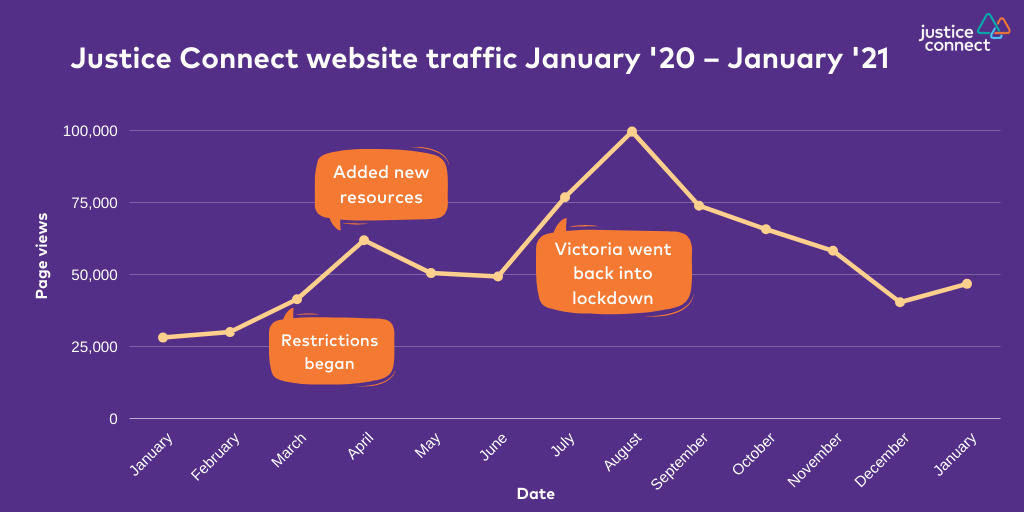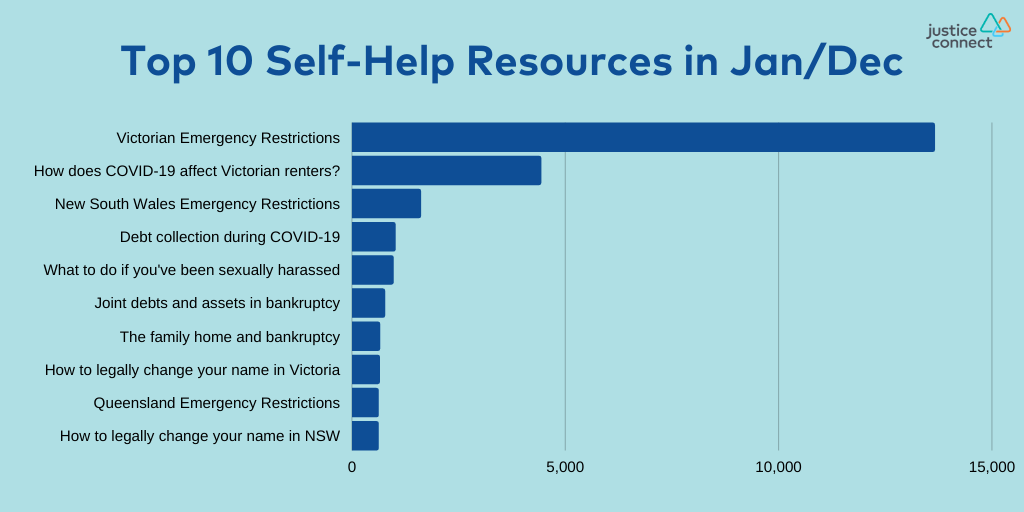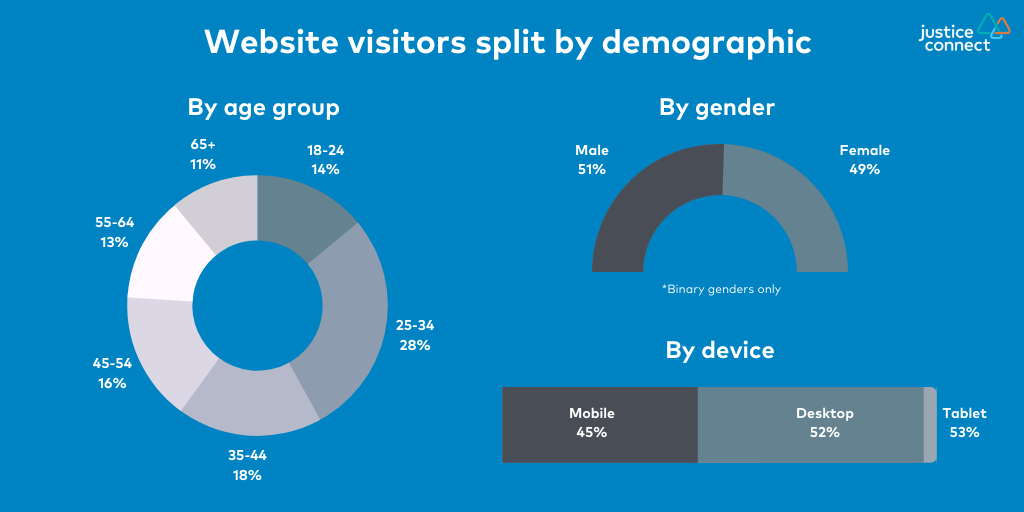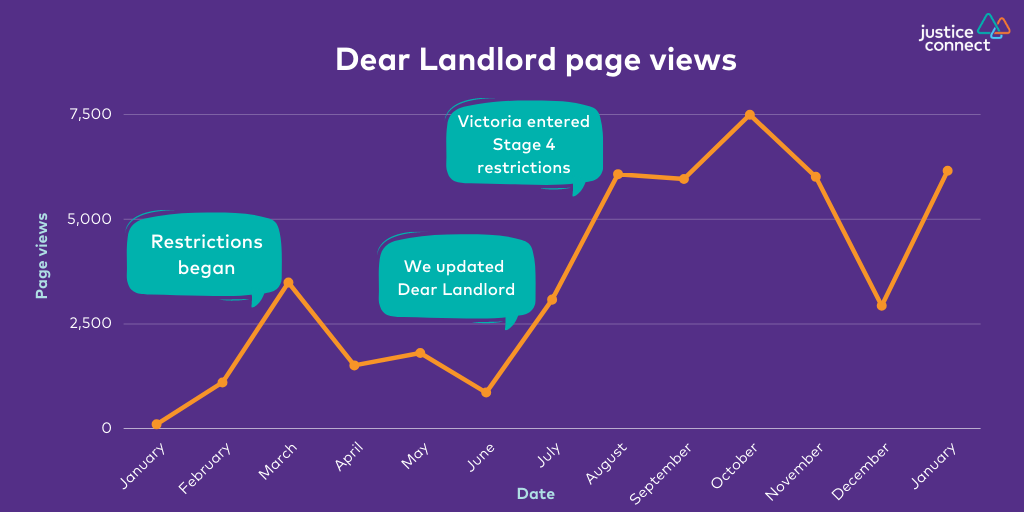Insights from our December & January COVID-19 response
24 Feb 2021
Since we began our COVID-19 response nine months ago, our teams have taken an evidence-based and iterative approach to our service delivery. This helps us shift the ways we deliver legal help to where it is needed most by listening to both qualitative and quantitative data. We’re continuing to share these insights in the hope of increasing our impact across the legal services sector.
This report-back will cover the period from 1 December – 31 January (noting that Justice Connect was closed from 23 December until 4 January). As always, you can review our previous findings by reading our Fair Matters blog.
Our data on demand for legal help in December – January
During December and January, we had close to 45,000 people visit our website. This is down from the previous period of 57,500 visitors, which is overall in line with similar dips in traffic and engagement on our other channels during the holiday period.

Over at Justice Connect Answers, our free online legal clinic available to people with simple legal questions, we saw over that a quarter of the questions submitted were related to financial issues. This is continued evidence of the financial pressures the COVID-19 pandemic is having on people in Australia.

How are people finding Justice Connect?
The most frequent way people find our legal resources is through organic search. 53% of visitors to our site find us this way. These were the five most common search phrases people used to find our information in December and January:
- “how to deal with transphobia”
- “sequestration order”
- “power of attorney nsw”
- “domestic building legal service”
- “nsw state of emergency”
The next largest portion finds us through our targeted digital consumer outreach across multiple channels, in particular through our paid search advertising. We maintain a healthy flow of referrals from networks like VCAT, the Victorian Government’s coronavirus website, Federation of Community Legal Centres, Tenants Victoria and Consumer Affairs Victoria.

We ran some analysis on what types of self-help resources people have been accessing over the last four months. This shows that our emergency powers resources continue to dominate the information people are seeking, followed by information for Victorian renters. Financial troubles remain steady, whilst employment issues seem to be subsiding. We will continue to monitor these trends and use the insights to anticipate what resources may be needed due to policy changes.

Who were our help-seekers?
Our targeted consumer outreach program helps us surface important insights about the types of people who are interacting with our resources. During December and January, we saw that the majority of people accessing our content were younger people. Interestingly, there was a 40% increase in traffic from the 18-24 year old cohort during this period.

Understanding the habits and motivations of these people helps us respond to their legal needs more effectively. A recent example is the message testing we undertook in December and January to see whether messages that included emojis or messages that didn’t were more engaging. We found that including emojis increased click-through rates (CTR) on our resources by 25% and decreased the cost per click (CPC) by 10%. These results were even further exaggerated for the older age group.
Whereas previously we saw higher percentages of male visitors to our website, this period the binary gender split was fairly even (51% male and 49% female).
Another indicator we monitor is what kinds of devices people use to access our information. During December and January, we saw that our mobile traffic was up and our desktop traffic was down, likely due to not working from offices or their desktop computers during the holiday period.
More than half of our audience lives in Victoria, with the next largest cohort living in New South Wales. During the last two months, we saw traffic from New South Wales residents increase from 21% to 27%, likely because of an increase to our NSW Government COVID-19 Emergency Restrictions resource during the Northern Beaches COVID-19 outbreak.
How Dear Landlord helped prevent evictions

Our traffic to Dear Landlord declined over December, but steadily increased in January. This increase may correlate with two key welfare changes implemented in January 2020: the coronavirus supplement decreasing from $250 to $150 on January 1, and the JobKeeper payment rate changing on 4 January. 1 January also marked the end of the Australian government’s temporary debt relief measures.
The most common reason people continue to use Dear Landlord is for advice and guidance in negotiating rent reductions with their landlords, indicating that the flow on financial pressures of 2020 are far from easing.

Looking forward: the legal needs we’re anticipating and preparing for
We are anticipating an increase in demand for COVID-19-related tenancy, financial and employment problems from March onwards, when we will see further impacts from the JobSeeker and JobKeeper welfare decreases, an end to the Victorian eviction moratorium, the implementation of the new Residential Tenancies Amendment Act 2018 in Victoria, and the Government’s planned Industrial Relations reforms via the Fair Work Act Bill currently in Parliament.
As a result, our Homeless Law team are currently developing a third iteration of the Dear Landlord self-help tool. Using our insights and user-testing experience from the current version of Dear Landlord, we are improving the design and utility of Dear Landlord to ensure that Victorian renters are able to access the resources and support they need to stay safely housed. We will also use our consumer research and insights to help increase awareness of Dear Landlord throughout February and March so that renters know what tool are services are available to them if and when they need it.
In anticipation of the legal matters people may begin facing over the coming months, we have produced and published new resources for dealing with mortgage default. We will also continue updating existing resources on bankruptcy, claiming unpaid wages, and debt collection. Our hope is that by producing online legal resources, they will play a preventative role and help people tackle problems before they become entrenched legal issues.
Looking for more insights on legal service delivery? Subscribe to our mailing list to stay connected with us.

